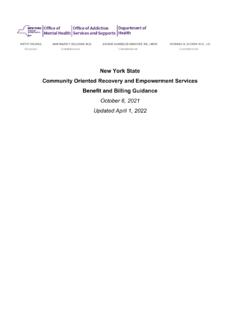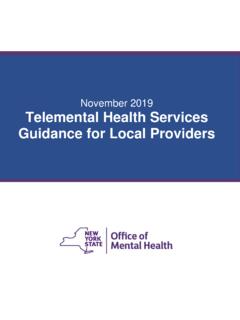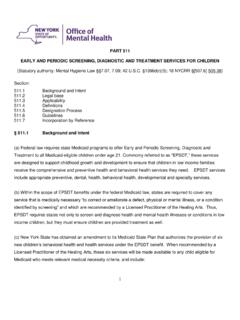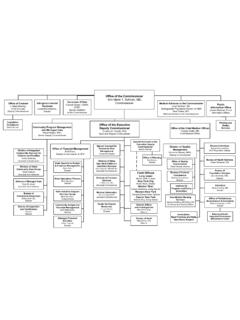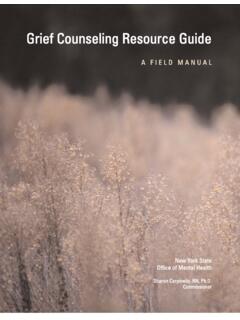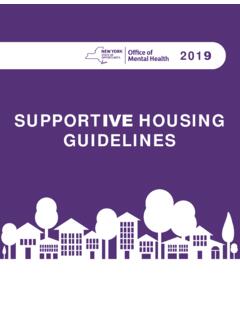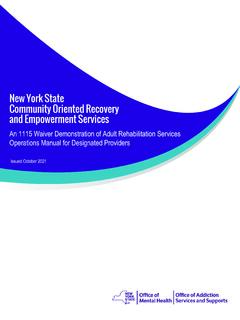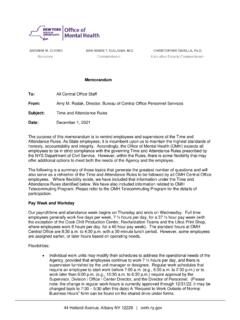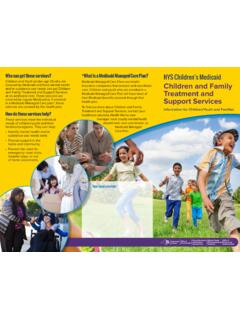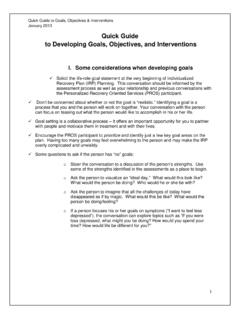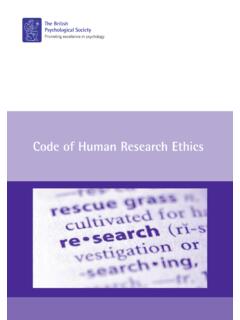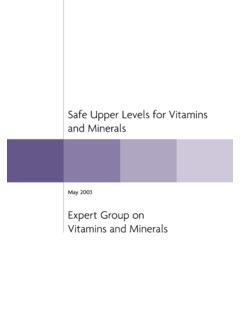Transcription of Peer Specialist Certification - New York State Office of ...
1 The peer Specialist Certification Process in New York StateOffice of Consumer Affairs Webinar SeriesMay 6, 2014 Joseph Swinford, Deputy DirectorNYS OMH Office of Consumer AffairsWhat is peer Specialist Certification ? Process for acknowledging skills acquired by peers that qualify them to assist another in their recovery journey Includes standards for training and experience Promotes a skilled workforce Allows funding from new sources Establishes the qualifications for professional recognition for individuals working in the mental health system based on The Shared Personal Experience paradigm Historical Background Traditionally persons providing peer to peer services did not require Certification Training and skill development was left
2 Up to individual organizations providing services Many individuals also sought training through specialty advocacy programs or program such as WRAP, DBSA, etc. Funding was primarily through Block Grant or other funding under the control of mental health authorities ( State ) New funding sources such as Medicaid began to require standardization of training and experienceThe National Landscape Georgia is widely recognized as the first State to certify peer Specialist for Medicaid in 2001 In 2007 CMS issued a State Medicaid Director Letter clarifying: States may opt to provide peer to peer services through Medicaid The following items must be addressed.
3 Care-Coordination - Within the context of a comprehensive, individualized plan of care that includes specific individualized goals Supervision By a competent mental health professional (as defined by the State ) Training and Credentialing Must be defined by the State , providing peer support providers with a basic set of competencies necessary to perform the peer support function, and include continuing educational requirements In 2013 iNAPS issued a draft National Practice Standards As of September 2012 there were 36 states that offered a Certification program for peer specialistKaufman, L.
4 , Brooks, W., Steinley-Bumgarner, M., Stevens-Manser, S. 2012. peer Specialist Training and Certification Programs: A National Overview. University of Texas at Austin Center for Social Work New York Experience A rich history of providing peer to peer services through various non - Medicaid funding sources A diverse array of quality training through out the State One of the first states to develop a civil service job class for peer Specialist working in OMH facilities Between 1997 and 2000 with funding from CMHS New York peers developed a process for Accreditation of peer run programs In 2011 the New York State made the decision to move all mental health
5 Services into Medicaid Managed Care To insure continued opportunities for peer services OMH is developing a peer Specialist Certification process in conjunction with peer leadersIssues Related To Certification Required areas of competency Acceptable training Practical experience General qualification Education Writing skills Recovery philosophy Personal recovery support References Code of ethics Continuing Education/RecertificationWho Must Become Certified? Anyone working in an OMH facility as a peer Specialist (both State employees and contractors)
6 peer Specialist who provide services that are paid for by Medicaid Managed Care Persons who provide peer Support Services under the 1915i wavier AKA the plans peer Specialist who work for the VARequirements for Certified peer Specialist General Qualifications 18 years of age or older Have a high school diploma or GED Publicly self identify as a person who has direct personal experience living a life of recovery, overcoming the challenges resulting from a diagnosis of mental illness Have sufficient knowledge of recovery, overcoming the challenges resulting from a diagnosis of mental illness to assist others with recovery Current or former recipient of mental health, or dual disorder services Not currently hospitalizedFormal Training Provide a level of knowledge and understanding in the following areas: General Professional Skills such as: Advocacy Values Ethical balance Basic Technical Skills such as: Active Listening Strategic Disclosure Recovery Support Tools and Goal Setting General Mental Health Knowledge such as.
7 General knowledge of mental illnesses General knowledge of treatment of mental illnessTraining Options 2 Options For Training: Option 1 Online training through the Academy of peer Services (APS) website Option 2 Skills training obtained through other programs or on- the- job training must pass the competency test for each of the classes for the Core Courses on the APS website. Examples of other trainings include: In person training offered by various peer run agencies ( MHEP, HTH, etc.) peer support trainings through national programs ( self -Help Clearing House, DBSA, etc.)
8 On the job training through a peer run agency self taught through various activities and experiencesPractical Experience In addition to Formal Training, practical or field experience of applying the skills of peer Support is required: A minimum 2000 hours of either in a paid or volunteer experience doing the following types of activities: Providing peer support either 1-1 or in a group setting Documentation of activities Writing plans for interactions including assisting others in setting and pursing goals Working a member of a team Coordinating with traditional service providers Utilize recovery tools to assist others Coach through role modeling Benefits advisement Utilizing personal recovery tools and activities to maintain one s own recovery Maintaining the shared personal experience approach to working with others regardless of settingPractical Experience
9 (cont.) Practical or field experience must include supervision which involved: guidance in working with individual based on the shared personal experience of recovery Appropriate role modeling guidance in using recovery tools (Supervisor must be trained and experienced in these themselves) Implementing trauma informed approaches Consultation and debriefing on specific cases and issues Supervision must have been from someone who has a clear understanding of the shared personal experience approach related to recovery (including the values and ethics)
10 With knowledge of how to avoid cooptation If direct supervisor was someone other than an experienced peer Specialist , then the documentation must include how an experienced peer Specialist was involved in the supervision of the programmatic elements of peer To Become Certified Submit an application packet that includes: An essay showing a minimum of 12 months of ongoing successful recovery covering the following areas: Concise overview of the applicant s personal recovery story Tools and activities utilized by the applicant to achieve and maintain their personal recovery Description of how the applicant discloses they have been diagnosed with a mental illness for the purpose of education.
